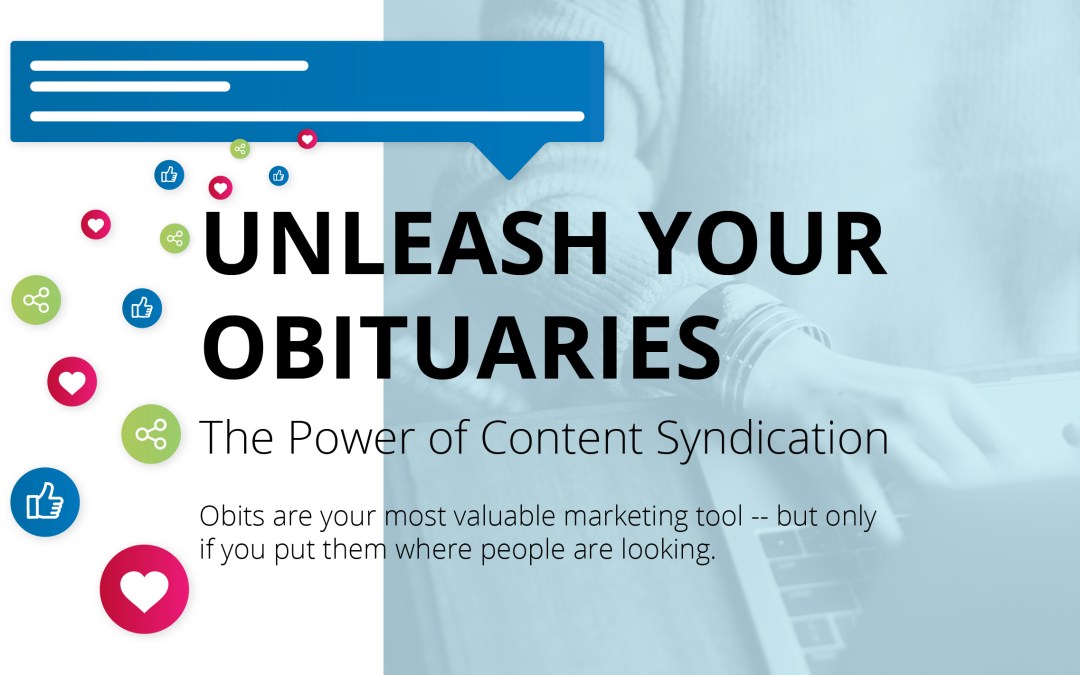Unleash Your Obituaries: The Power of Content Syndication
Picture it: One June morning, two people wake up and get a call from an old friend telling them that a childhood classmate just died. They want to know more—so, over breakfast, they each take the natural first step and search online for an obituary.
One person finds the correct notice at the top of their search results. The other finds broken links to the wrong person. One of them attends the memorial service the funeral home hosts that afternoon. The other misses the service, has no idea what a beautiful job the funeral home did, and keeps their potential future business with them at their kitchen table.
What could cause such dramatically different results?
To find out, Legacy analyzed the search results of two major multi-rooftop funeral homes with similar market size and demographics. Both invest in robust websites where they publish high-quality obituaries. Their only key difference: One of these homes syndicates, or shares, their obituaries to a larger audience through a distribution partner. And the other doesn’t.
Take a guess which one had the results the searcher, and the funeral home, both wanted.

‘That’s the Obituary I Was Looking For!’
Syndication means, simply, distributing the same content in as many places as possible. It’s how Associated Press news stories run in all the newspapers. It’s how your favorite national talk radio host shows up on all the local stations. And it’s why some funeral homes are outperforming others in search: because sharing their notices through a large partner like Legacy means that Google ranks them higher in searches.
Why is this important? As many as 75% of people never scroll past the first page of the Google search results, but 25% click the top result. The good news: The people discovering syndicated content like obituaries are 3x more likely to become leads from them than if they’d seen you in paid advertising, like, say, a Google ad.
Putting Syndicated Obits to the Test
To see these results in action, Legacy google-searched the name of a recent deceased at those two funeral homes, together with the word “obit.”
For the first funeral home—let’s call them Desert State Mortuary—we found the obituary we needed immediately at the top. Right beneath these results followed more good links, including social media posts sharing the correct obituary with friends and family of the deceased. In other words: people who would care about attending the funeral, and who therefore could turn into leads. These people all saw the funeral home’s brand prominently at every step of this online journey.
But when we performed the same kind of search for the second home—we’ll call them Sun Belt Funerals and Cremation—the search results page did not show us the correct obituary. Just a bunch of wrong links to the wrong deaths.
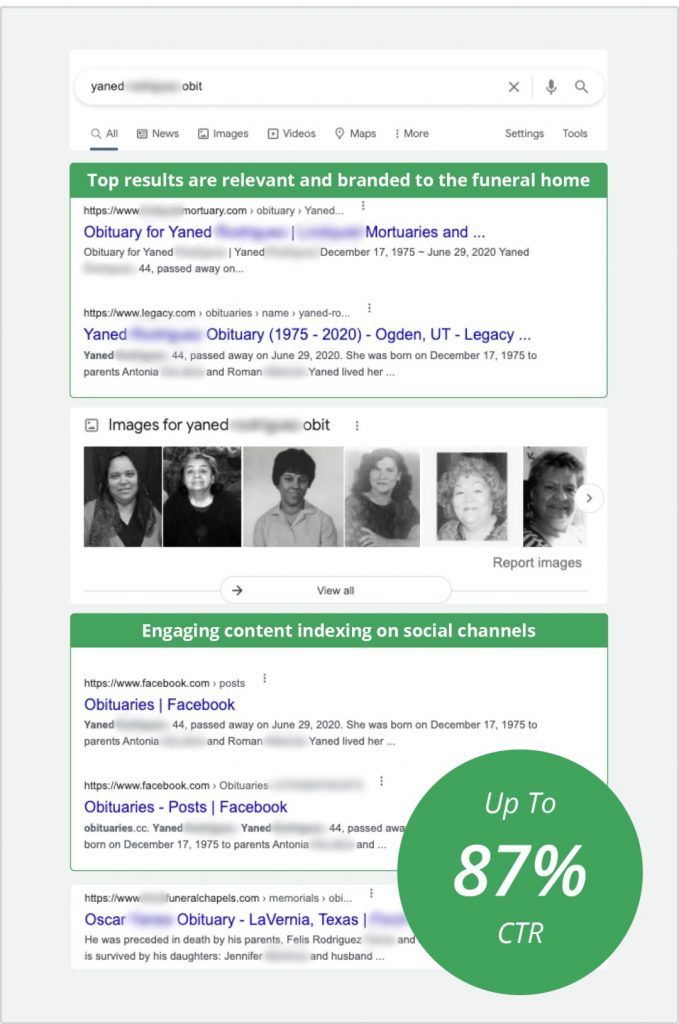
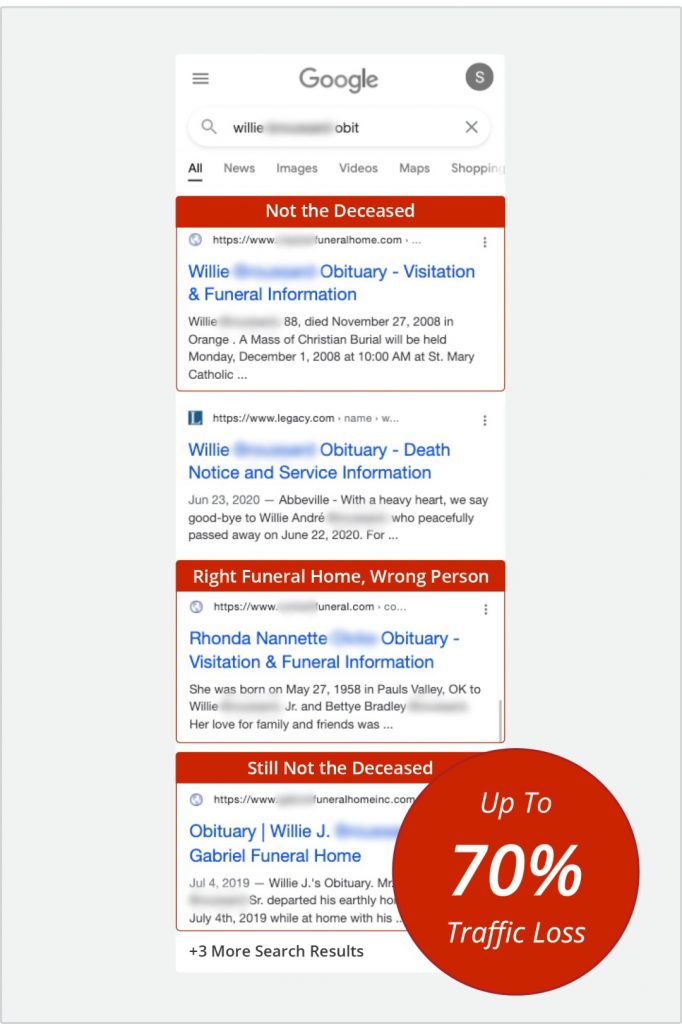
‘No One Can Read an Obit They Can’t Find’
Every day, the people in your town read the obits. Mostly, these days, they read them on their phones. But here’s the thing: In order to read your obits and then attend your services, they have to be able to find them.
“No one can read an obit they can’t find,” says Tom Antram, President and CEO of French Funerals & Cremations. “It’s only valuable content if people see it.”
This is what syndication does. It puts your name at the top of search results, and also on the second, and third, and fourth results. This perk—your funeral home name and accurate information displaying across multiple top results—is key, because, as Ryan Thogmartin, funeral home marketing expert and CEO of Disrupt Media, points out: “Your funeral home will never be the only search result. Google just doesn’t work that way.”
The good news: Google search results strive to put authoritative content first. When your name and website appear early in the search engine listings, you are branded as an authority and trusted source. Syndicated content is vital to telling Google: My funeral home is legit, and this is the obituary your searcher wants. It gives you more control over those first-page listings.
But the funeral home who isolates their notices on their website leaves Google without good, accurate content. Google has to fill all the slots on that first page. What’s a search engine to do?
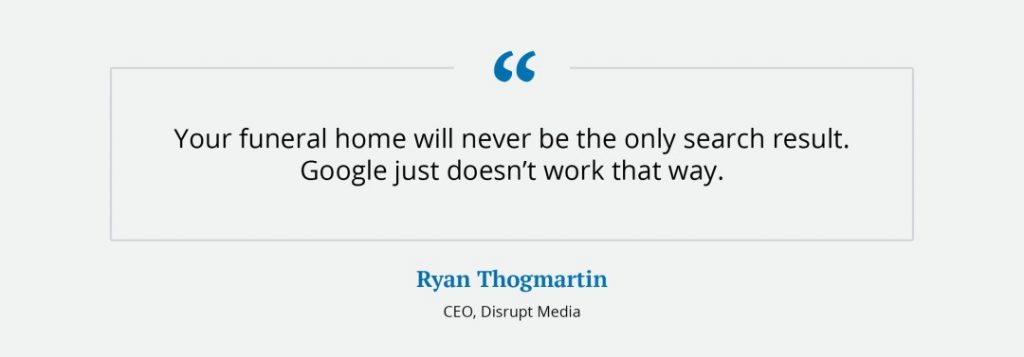
As the results for Sun Belt Funerals and Cremation prove: Left to its own devices, a search engine will always make some dicey choices. It’s an algorithm, after all, not a person who understands that “Willie X of Abbeville, LA” is not the same as “Willie X of Port Arthur, TX.” Because Desert State Mortuary syndicated their notices with a distribution partner, they successfully owned the content from the first result down. Their name was front-and-center. Not only did the results prominently display their website, but the rest of the front-page results were also accurate and branded to their funeral home. Desert State Mortuary ultimately owned 87% of the click-through rate for the test search. That’s a lot of clicks, and a lot of people. And the funeral home that isolated their obituaries, Sun Belt Funerals and Cremation, left 70% of them behind.
Get Them In the Door
Obits are branding for your funeral home. The more someone sees your funeral home name as they read notices, the more repetitive marketing they’re exposed to. This puts you top-of-mind when that obit reader needs end-of-life help.
But obits are also a vital link for your most important source of leads: in-person services. That’s because 85% of people are still far more likely to share news about a death via an online source than anywhere else (Legacy.com survey of end-of-life consumers).
The best marketing is traffic through your doors. Getting those visitors requires broad distribution and reach for your brand in your community. Obits are ideal for this role: people can’t attend services they don’t know about. The more they read your obits, the more likely they’ll come in to your facility and be exposed to your business and brand. We know in-person services will be coming back soon. Are you ready to reach all the people who want to attend?
And those pre-planners who make your budgeting so much easier to manage? Obits are key to their leads, too. Remember, the #1 prompt for funeral pre-planners is the death of someone they know (Source: 2019 Legacy.com pre-planner consumer survey).
Which path will your funeral home take?
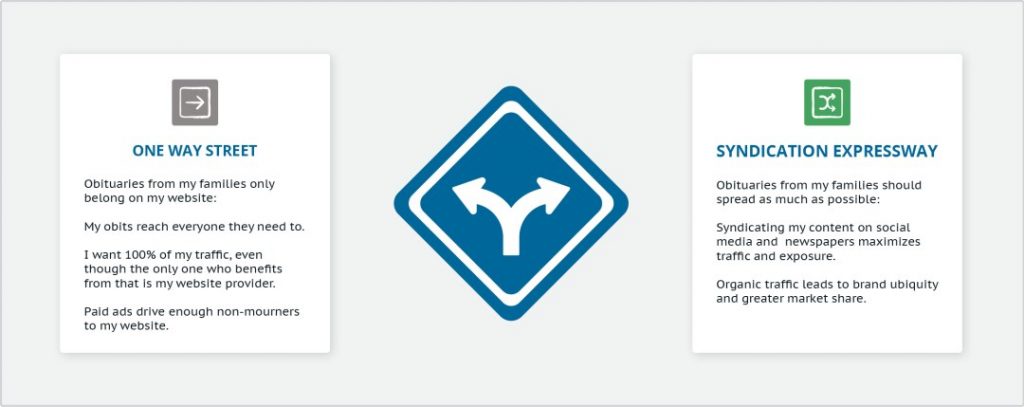
Powerful, Simple, Cost-Effective: What’s Not to Like?
When someone searches online for one of your funerals, what will they find?
With syndicated content, they’ll find you. Then they’ll walk through your doors and become the next family you meet.
“Your website is only one tool, and it isn’t even the most important one,” says Welton Hong, CEO of funeral home marketing service provider Ring-Ring Marketing. “You need people to see your name, as often as possible, all over the place.”
Leads. Brand exposure. Revenue opportunities. Traffic and market insights. Syndicated obituaries deliver all these benefits, at no-cost and with no additional effort.
“The purpose of an obituary is to tell the community, ‘This person died, funeral services will be held at this day and time at this funeral home to remember them,’” says Buddy Phaneuf, president of Phaneuf Funeral Homes and Crematorium. “Your potential for future business are the people who walk through your doors. Why wouldn’t you want to share that information with as many people as possible?”
The question isn’t whether or not syndication works. The question is, are you syndicating? If not, why not?

